The time has finally come. After two years of relentless toil, I am finally released from having to balance all my academics with service learning, creative activities, and sports. Finally.
Actually, it’s not like that. Exactly the opposite is true to be honest. Looking back, I realized what fun activities I did, how much I learned, and that apart from having made great memories upon which I look back fondly, the experiences I gained have prepared me for my future life in many ways. In 55 posts, this blog sums up all of the service at Hope for Kids, playing in the band and various other arts and creativity activities, and sports, in particular volleyball, that I did over my two DP years. Experiences that come to mind are socializing and playing exciting volleyball matches during my two SAISA tournaments in Kathmandu and Muscat, performances with the band, and spending the children at the cancer hospital as they created various small crafts or drawings.
Apart from looking back fondly at what I was fortunate enough to experience though, I want to use this post to reflect more productively so that I become more aware of what I learned and can understand the benefit of my activities better. Although I knew why I did certain activities, doing this again retrospectively by using the seven learning outcomes allows me to look forward as well and see how I can remain balanced in the future. I will therefore address each outcome separately:
1. Identify own strengths and develop areas for growth
I feel like this learning outcome was addressed permanently through the last two years. Instead of dividing this learning outcome into two parts, for me identifying strengths works together with developing areas for growth since I still want to improve in areas that I am already strong as, since I am eager to get even better. For example, I am aware that I am very good at volleyball, having lots of experience as team captain for several years now as well, but the sport is nonetheless one of the areas I am most eager to improve in, which I did by being dedicated to the training. Moreover, I have realized what things I could really improve on and I addressed that through my activities, intending to grow and become a person with more skills in a variety of areas. The yearbook and shirt designs for example were something that I did not only because it was fun but also because I thought it’s good thing to get better at and be creative, as I thought that despite having designed logos, etc. before, I am not that good at it.
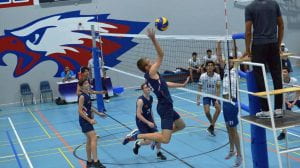
Myself spiking during the SAISA volleyball tournament in Muscat.
2. Demonstrate that challenges have been undertaken, developing new skills in the process
Many of my activities – and their respective posts – have several challenges attached to them that I had to address in order to be successful and learn new skills or improve existing ones. In my posts I often highlighted not only what I did in activities but also what I struggled with or wanted to improve in and how I did so throughout the course of doing the activity. This was a natural process for me during activities but looking back I could’ve been clearer and have a stronger reflection in each post about how I grew thanks to the experience. A challenge for example in the musical Oliver! that we performed was not only the music itself, but also playing with actors, which was really tough in the beginning but the final performance was great and I was really satisfied with my contribution.
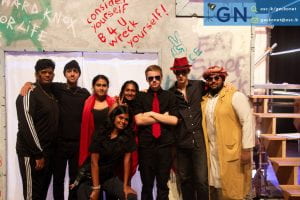
Me (second from right) with my classmates who were also part of the Oliver! musical.
3. Demonstrate how to initiate and plan a CAS experience
I am eager to do many different activities, and part of that is deciding what to do and how to start doing it. Mostly, I thought particularly about addressing all strands of CAS each week and throughout the two years. This resulted in me being very busy, but looking back I am really happy that I had such rich last two school years. Although I think I should’ve shown more or my thoughts that went into deciding why I chose to do certain activities, I think the number of posts demonstrate that I did many different activities due to my interest in different fields and my passion to be active in different areas. One activity that should be mentioned here is the CAS Project, on which I worked collaboratively with Milo, a friend and fellow student, and which require extensive planning and perfecting, before COVID-19 unexpectedly prevented most of the implementation.
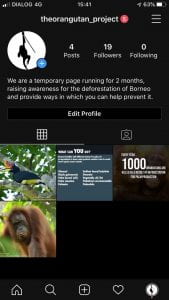
The Instagram page for our CAS Project.
4. Show commitment to and perseverance in CAS experiences
Many activities required a lot of motivation and perseverance to stay committed all the time. This was particularly the case during times when there was an abnormally large amount of academic work due as well, such as internal assessments. All the time, the main driver for everything I did was that it was rewarding, satisfying, and fun. Although it is easy to say that I did everything so that I can grow as an individual, most of the commitment to activities came from my love for the activities I was doing. Service at Hope for Kids is such an example. On Thursday afternoons, I was often tired and eager to relax before doing academic work, but instead we spent an hour after school at the cancer hospital. Getting there required an often annoying drive through the crazy traffic. But when I was there, I realized the importance of the work I am doing and therefore did the best I could despite my exhaustion. Some activities that addressed this learning outcome were things that I did on my own, in other words not activities set in place by others. This included working out and training for a half marathon, participating in photo and art competitions, doing an internship at IWMI, and all the things I did during COVID-19 lockdown at the end of my DP years.

Our service group at the cancer hospital.
5. Demonstrate the skills and recognize the benefits of working collaboratively
Working in groups has been important in nearly all my activities, which simply shows how important it is in life – we are nearly always surrounded by others with whom we have to solve problems or cooperate. Although this can be tough sometimes, it’s highly rewarding and there’s no escaping it anyway, so it was a great opportunity for me over the last two years that I learned the skills required for this. Communication is one of the most crucial skills when trying to achieve a goal together, be it on the volleyball court or when planning future service meetings. I feel like I am very fortunate that I was captain of the volleyball team and service leader. Being a leader in anything requires not only the necessary collaboration skills everyone needs to have, but adds some leadership skills to that such more planning, communicating and delegating with others, and more things that are less necessary for other group members. Having been exposed to these responsibilities will undoubtedly be a benefit in the future in many areas of my life.
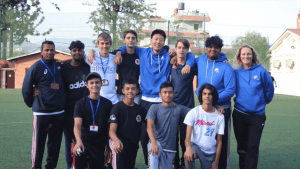
Our volleyball team at Lincoln School, Kathmandu.
6. Demonstrate engagement with issues of global significance
Addressing problems that our increasingly global society faces today is very important, partly simply because one becomes more aware of the difficulty we all have to address and think about when we want to become a fairer, more sustainable, and safer society. I have had the chance to engage with two issues of global significance during the last two years. Most significant in terms of my contribution I believe is my participation and leadership of Hope for Kids. We have made a real difference to the life of the kids suffering from cancer, and being a volunteer in this area is something that is necessary in all parts of the world to make the life of cancer patients more bearable. The second engagement was during my CAS Project – which was an opportunity to address every single one of the seven learning outcomes in fact. Milo and I were passionate to bring awareness to the deforestation of Borneo’s rainforests, which causes species to become endangered and ultimately extinct, while the rainforests become replaced by ‘green deserts’ – palm oil plantations. Not only is the deforestation a loss of biodiversity which humans cannot justify in my opinion, but it also threatens our climate, which will affect not us as severely as future generations. In combination with this, I also organized a small climate awareness campaign with classmates as a support for the Friday for Future movement initiated by Greta Thunberg. Despite dreaming this, I know that such efforts often only initiate small change, but change nonetheless.
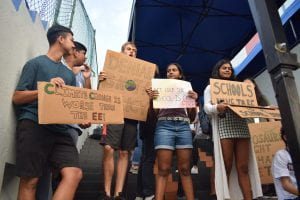
Myself and others during the climate change awareness campaign.
7. Recognize and consider the ethics of choices and actions
Ethics are addressed in anything we do, even if we are not aware of it I believe. But I believe that thinking about which things are ethically right or wrong and what things will be productive to me as well as to others is essential in life. In team sports for example saying the right things to motivate my team but nonetheless saying the truth touches on ethics, as do many other activities I have done. However, the main area where this is applicable is the activities that also focus on the previous learning outcome – addressing issues with a global significance. A reason why certain issues are of global significance is because of their complexity, many different stakeholders with different opinions and values, and how they are woven into our society. This naturally requires ethical thought, and while one can often come to the conclusion that there is no completely right solution, one can nonetheless find a way with least negative impact for all – which is hardly ever the path of least resistance.
I believe that this learning outcome, together with the last, are probably the most important, although it is hard to rate them. This is because doing things that are ethically right and that benefit society is what all humans should be intending to do. I do not expect anyone to dedicate their whole life to making others’ lives better – I do not do that myself – but I would love if everyone does their part to ensure we will have a better future as a society and to live in harmony with the rest of the organisms on the earth. I know this sounds ideal and is something that is probably impossible to reach, but that does not mean that one should not strive to make a positive change in this world instead of being absorbed by obtaining material value to our own lives like most of us tend to do.
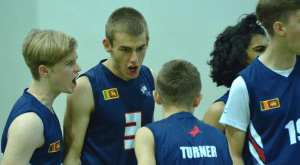
A funny snapshot of my volleyball team being hyped up during a break in the game.
I find that I have addressed all the learning outcomes well, suggesting I got a lot out of the activities, which is of course satisfying to know. More than that though, I look back on the things I did and remember how enjoyable they were, which I think is at least just as important. Although I find that it is important to try and improve in things that you are not very good at and look back on your progress, some things for me are important to do simply for the love of doing them. This is especially true because the last two years of school were very tough – many assignments, homework and tests took up a lot of time and energy and therefore seeing the activities I did at least partly as a way to be in a mindset other than ‘I need to improve and reflect so that I can do better’ was also important to me. I am happy with my activities over the last two years and I am glad to have this blog as an online journal in which I can look back at the experiences I had.
With this, the second major section of my life is over – my life in school. The first big change was when I started first grade, that was January 2007 in South Africa. Now, 12 years later, that life ends. I am thankful to all who have made this part of my life so enjoyable – my family, teachers, and friends – as my experiences would not be comparable had they not been shared with you. I cannot deny that I am nostalgic and sad looking back, together with my happiness and excitement looking forward to my life as a more independent person with more responsibilities as an adult and citizen of our increasingly global society on which I hope to have a positive influence.

Luca,
This is a stellar reflection looking back at a kaleidoscope of engagement and learning in OSC’s Creativity, Activity and Service (CAS) program. You have chosen to engage in a wide variety of rich experiences during the Diploma Program and your CAS Blog has faithfully recorded your growth and development. I appreciated how you focused this final reflection through the seven IB learning outcomes in such an authentic way. It is clear you and many of OSC’s Class of 2020 have developed the compassion, collaborative skills, self-awareness, global sensitivity and other dispositions that you need to be an agent of change to make the world a better place. I wish you all the best and look forward to reading more about your future learning (and bird watching!) adventures. Do stay in touch!